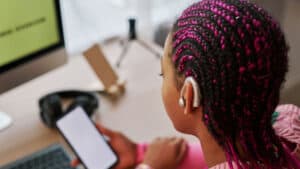Transcript:
[Interpreter] Hello, my name is Stephanie Cawthon. I’m a professor at the University of Texas at Austin, and now I’m the new director of the National Disability Center for Student Success. I’ve worked for many years as a researcher, a teacher, and an advocate for students with disabilities.
[My work is] mostly in those years between high school and middle school to high school and post-secondary education and work. I’ve worked with teachers, transition specialists, families, college students, and administrators. So here’s some things to consider as our young people get ready for life after high school and embark on that journey.
There are a couple of things. First, I would say mindset, and the second is skills. So in terms of mindsets, it’s important to have an open mind. The journey after high school is not a straight line. The path is meandering. One goal can then lead to another goal, and when one door closes, another can open. Nothing is final. It’s important to build your circle of support. Learning from others we all know is imperative.
Mentors, family members, peers, teachers. You are also a mentor and a role model. So share your journey with other people who are younger than you, because they need you.
The second thing is skills. Time management is key. Really getting practice and setting a schedule for your day and increasing those times when you’re independent and managing your time while you’re working. And then after that, always circle back when you’re done.
Another thing is communicating with others. There are so many different platforms today that we engage with other people. Social media, face-to-face communication. We communicate via email and online, countless different ways of communicating, and it’s important that we learn how to share our thoughts and ideas through those different channels because they’re not all the same. Not only do the platforms vary, the style does as well. Now, how each platform is used to engage with other people, again, it varies.
Learning how to incorporate feedback. Faculty often provide feedback to students in a variety of ways. Grades, also written comments to your responses in class, during office hours, and those types of meetings. So think about where you can find that feedback from faculty in those different spaces. Sometimes you need to ask for more feedback, and that’s fine.
Really, people are often happy to provide that feedback when asked. And the last thing that’s important to understand is when someone gives you that feedback, that often means that they care. And it’s important that we keep that framework in mind. It can be a challenge to receive that feedback. It can often feel disconcerting, but knowing that people want you to grow and succeed is important. So best of luck with your journey to you and your families. And keep in touch. Thank you.
Learn more:
Is your teen going to college with a disability? Here’s how to help them get ready.
How to teach a child to self-advocate: Lessons learned from my mom.
Life after the IEP: Helping my child with a disability transition to adulthood



